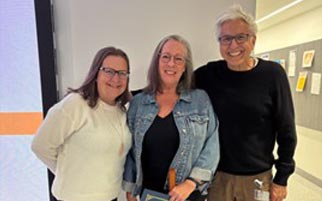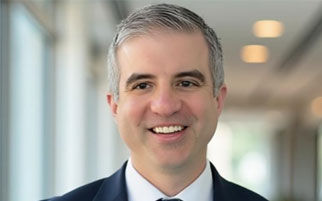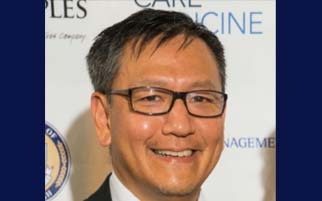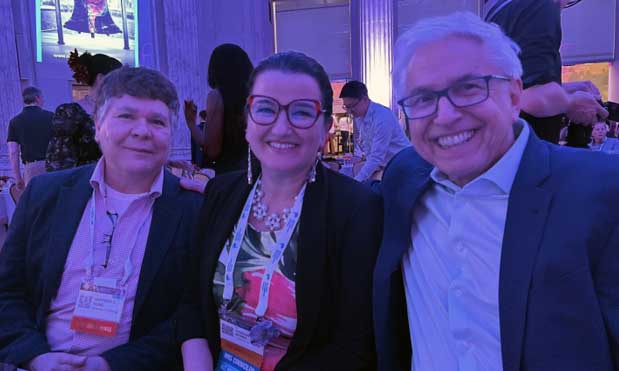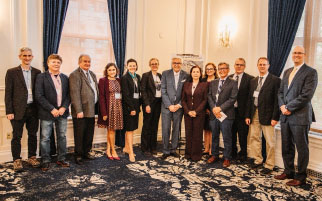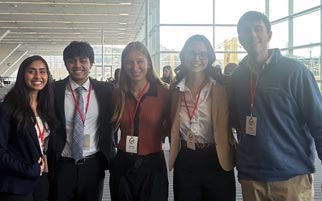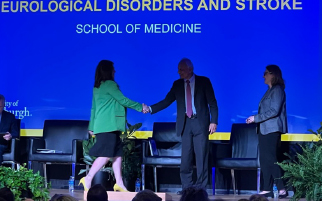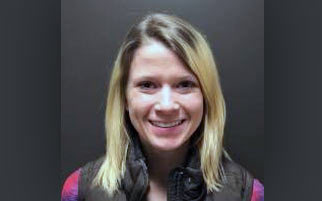Safar Center Administrator Linda Ryan Retires after 38 Years
Safar Center held a celebration to honor Linda Ryan, for her over 38 years of service to the University of Pittsburgh School of Medicine.
In Loving Memory of Eva A. Safar (1930 – 2025)
On December 21, 2025 – the Winter Solstice – Eva A. Safar passed away peacefully at her home in Eugene, Oregon.
Former Safar Center fellow Jessica Wallisch publishes findings on a novel approach to bedside magnetic resonance imaging for neonatal and pediatric patients on ECMO
Former Safar Center T32 fellow Jessica S. Wallisch, MD, published a manuscript this week in the Journal of the American Heart Association.
Linda Ryan Receives Outstanding Career Achievement Award
On October 13th, Linda Ryan, received the University of Pittsburgh Health Services Research Administration Outstanding Career Achievement Award.
The Safar Center for Resuscitation Research at the University of Pittsburgh School of Medicine was founded by the late Dr. Peter Safar in 1979, initially as the International Resuscitation Research Center
In recognition of Dr. Safar’s innumerable contributions to the field of resuscitation medicine, it was renamed the Safar Center for Resuscitation Research in 1994.
The Safar Center’s current research programs include Traumatic Brain Injury, Child Abuse, Cardiac Arrest, Emergency Preservation and Resuscitation, Hemorrhagic Shock, Combat Casualty Care, and Rehabilitation of CNS Injury. Center investigators work closely with the depts. of Critical Care Medicine, Surgery, Neurological Surgery, Anesthesiology, Emergency Medicine, and Physical Medicine and Rehabilitation at both the University of Pittsburgh Medical Center and Children’s Hospital of Pittsburgh.
In addition to conducting basic research, the Safar Center also provides training to the next generation of resuscitation researchers. The Center is a 20,000 square-feet freestanding research facility that houses the laboratories of scientists and clinician-scientists working across a broad spectrum of fields important to resuscitation medicine.
The Safar Center for Resuscitation Research at the University of Pittsburgh School of Medicine was founded by the late Dr. Peter Safar in 1979, initially as the International Resuscitation Research Center
In recognition of Dr. Safar’s innumerable contributions to the field of resuscitation medicine, it was renamed the Safar Center for Resuscitation Research in 1994.
The Safar Center’s current research programs include Traumatic Brain Injury, Child Abuse, Cardiac Arrest, Emergency Preservation and Resuscitation, Hemorrhagic Shock, Combat Casualty Care, and Rehabilitation of CNS Injury. Center investigators work closely with the depts. of Critical Care Medicine, Surgery, Neurological Surgery, Anesthesiology, Emergency Medicine, and Physical Medicine and Rehabilitation at both the University of Pittsburgh Medical Center and Children’s Hospital of Pittsburgh.
In addition to conducting basic research, the Safar Center also provides training to the next generation of resuscitation researchers. The Center is a 20,000 square-feet freestanding research facility that houses the laboratories of scientists and clinician-scientists working across a broad spectrum of fields important to resuscitation medicine.
Birth of CPR
Classic photo from 1956 of Dr. Peter Safar in the development of mouth-to-mouth resuscitation component of Cardio-Pulmonary Resuscitation (CPR). Dr. Safar is positioned behind the Anesthesia machine on the left, managing the airway. Dr. Safar is known as the father of modern day resuscitation.
Birth of CPR
Classic photo from 1956 of Dr. Peter Safar in the development of mouth-to-mouth resuscitation component of Cardio-Pulmonary Resuscitation (CPR). Dr. Safar is positioned behind the Anesthesia machine on the left, managing the airway. Dr. Safar is known as the father of modern day resuscitation.


The History of the Safar Center
The Safar Center was initially founded as the International Resuscitation Research Center (IRRC) in 1979 by Dr. Peter Safar. In the late 1950s, Dr. Safar pioneered the development of the ABCs (airway, breathing, circulation) of resuscitation, including the technique of “mouth-to-mouth” resuscitation, and assembled these techniques, together with others, into what is currently known and implemented as cardiopulmonary resuscitation (CPR).
The study and application of additional steps of advanced and prolonged life support led to the development of the concept of cardiopulmonary cerebral resuscitation (CPCR).





